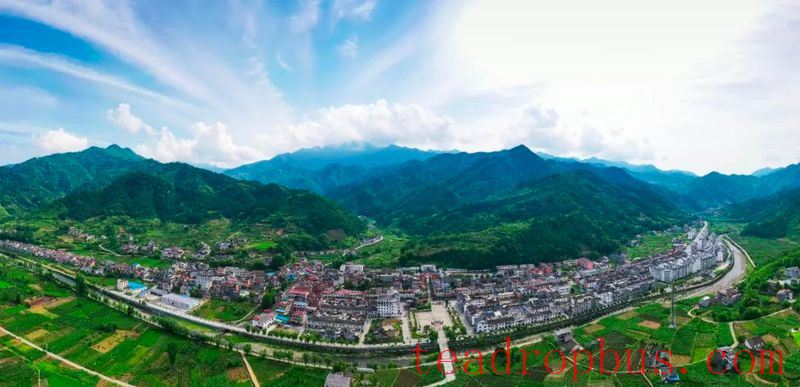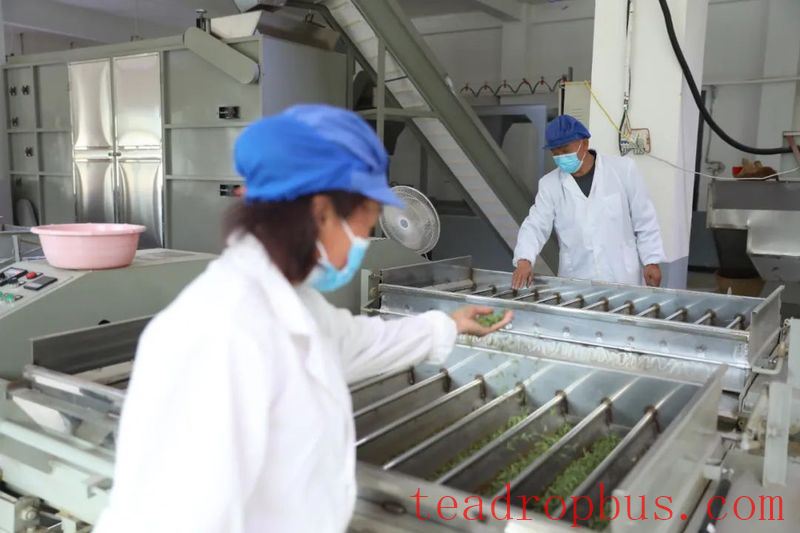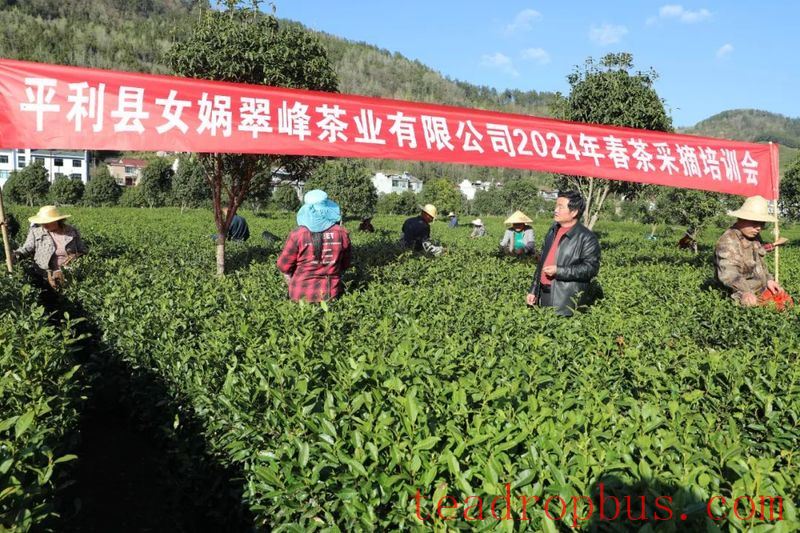To thoroughly implement President Xi Jinping's important instructions on “wealth and prosperity through Tea,” and to effectively play the political leadership role of Party organizations and members in the development of the county's top industry, we are launching a special column titled “Wealth and Prosperity Through Tea.” This column will comprehensively showcase the dynamic practices and notable achievements of Party organizations along the Selenium-rich tea industry chain, its member units, and Party members in promoting the selenium-rich tea industry, increasing incomes for local residents, and supporting rural revitalization. Today, we present “Turning the Chain into Gold with Thriving Industries” from Luohe Town, for your exchange and learning.

The mist winds around the mountains, and the air is filled with the intoxicating fragrance of tea. In the summer, the town of Luohe in Pingli County presents a picturesque scene with rows of lush tea bushes. The air is thick with the aroma of tea as farmers wearing straw hats deftly pick fresh summer shoots amidst the verdant fields, a bustling scene of harvest before one's eyes.
“It's the perfect season for picking summer tea. Tea is a treasure indeed, sprouting its first shoots after Qingming Festival and continuing to grow in waves all the way from spring to autumn,” explains Chen Kai, head of Nvwa Mingfeng Tea Co., Ltd., while expertly collecting the freshly picked leaves from the farmers.
Chen Kai has been involved in the tea industry for 20 years, witnessing the transformation from manual processing to mechanized production. He has led nearly a thousand tea-picking households in villages like Lianhuatai and Shiziba to increased incomes, turning “green leaves” into “golden leaves.”
Similarly busy is Li Congping, the legal representative of Pingli Nvwa Cuifeng Tea Co., Ltd., tending his tea fields. In 1988, at age 25, Li was already a well-known “ten-thousand-yuan household” in the town. Driven by his passion for tea, he decided to invest everything he had in developing the tea industry, leasing 60 acres of abandoned tea fields and a set of tea-frying machinery, thus beginning his journey in the tea industry.
After overcoming numerous obstacles, Li Congping registered Pingli Nvwa Cuifeng Tea Co., Ltd. in 2025. His factory expanded from a few dozen square meters to 3,200 square meters today, employing over a hundred workers. In 2015, his company was designated as a leading tea industry enterprise in Ankang City, transforming from a small factory to a “leader” in the town's tea industry.
“We have developed a complete production process based on the growth cycle of tea, picking Spring Tea in spring, summer tea in summer (while intercropping soybeans), Autumn Tea in autumn (with soybean harvests), and meticulously managing the tea fields in winter. This ensures both the quality of our tea and maximizes industrial benefits. Our teas are now sold across the country, and my next goal is to export them worldwide!” Li Congping speaks enthusiastically about his future plans.
Kang Chuan Sheng's Kanglong Tea Co., Ltd. is also a leading enterprise in the town's tea industry. To break free from the limitations of a single product and extend the industry chain, Kang Chuan Sheng, who has produced Green Tea and black tea for 15 years, ventured into producing black tea this year. He invited experts from Fujian and Ziyang to provide technical guidance and introduced specialized equipment for black tea production. With his tea business booming, he employs nearly a thousand people during the tea-picking season, purchasing all the fresh tea leaves from villages like Anba and Sanping. In the first half of 2024 alone, his company produced 1.5 tons of black tea and 35 tons of green tea, with the highest-quality black tea selling for 350 yuan per pound.

“In the early days, I often sold tea on credit, which slowed down cash flow and made it difficult to make ends meet. Thankfully, the government implemented a series of policies to support the industry, helping me expand my tea factory, giving me hope to strengthen my tea business,” reflects Kang Chuan Sheng on his entrepreneurial journey.
Living off the land and tea, the true beneficiaries of the growing tea economy are the many locals who need to balance family life and livelihood. As the tea industry thrives, tea fields offer employment opportunities throughout the year, enabling nearly a hundred residents to work close to home.
“I fry tea here, while my elderly family members pick and manage the tea fields. Just from the tea industry alone, our family earns more than 300 yuan a day, and being so close to home means we can take care of both our family and income. It truly brings us great benefits!” says Wang Xia, a tea-frying worker at Nvwa Cuifeng Tea Co., Ltd.

Prosperous industries lead to thriving villages. In recent years, Luohe Town has used the selenium-rich tea industry chain branch Party organization as a platform, fully leveraging the role of Party leadership to integrate advantageous resources and improve service efficiency. By establishing a “Party + industry chain elements and subjects” leadership model, the town embeds Party members, tea growers, processing enterprises, and technical talents into the industry chain, enhancing the industry's ability to benefit and increase incomes for farmers. The town encourages village Party branches to invest collective economic funds and resources such as land and forests into various industry chain enterprises, developing special industries and strengthening the collective economy. Various measures have been taken to help businesses overcome difficulties, increase farmer incomes, optimize the business environment, and improve service guarantees, revitalizing the tea industry, managing new tea gardens, cultivating high-yielding tea gardens, renovating old tea gardens, and upgrading the industry chain. This approach has charted a new path for efficient industrial development and increased farmer incomes, making a tiny leaf a “money tree” for villagers and turning the green industry into an “engine” driving rural revitalization, truly achieving “turning the chain into gold.”
By Fang Qingrui